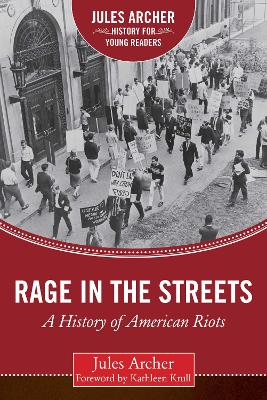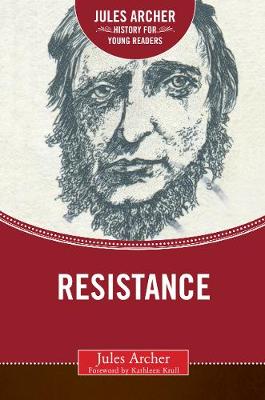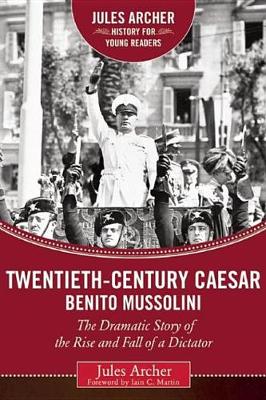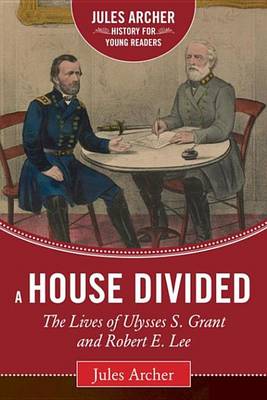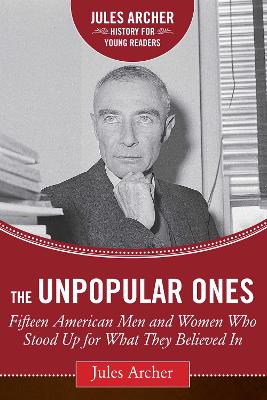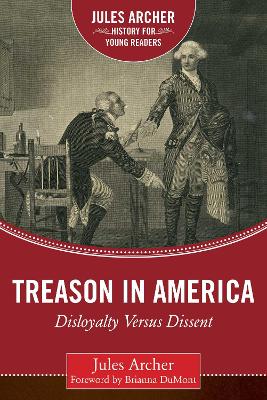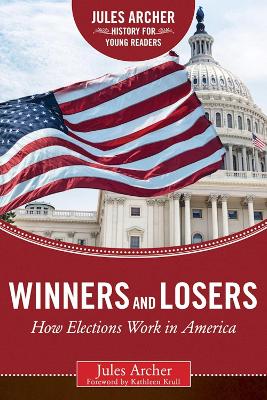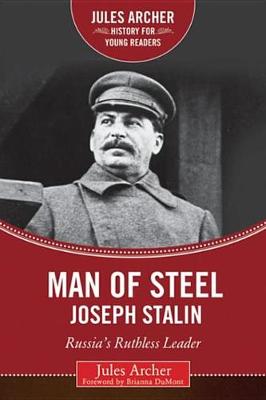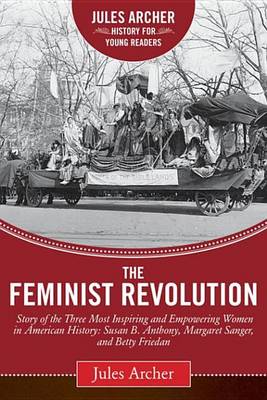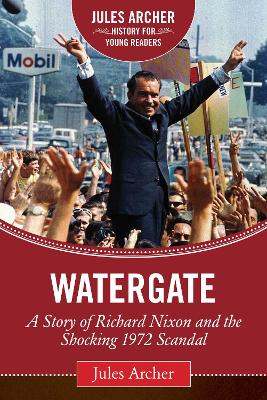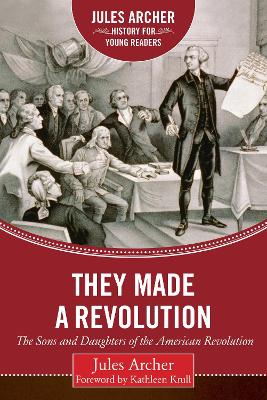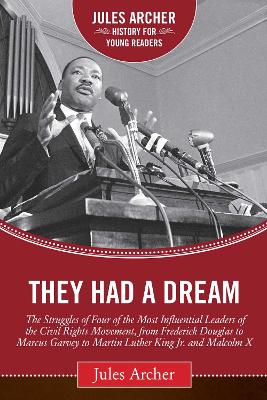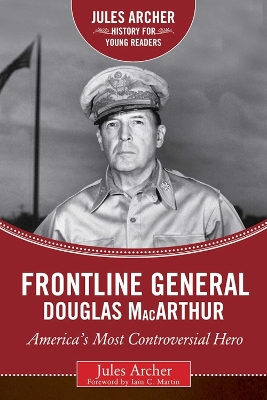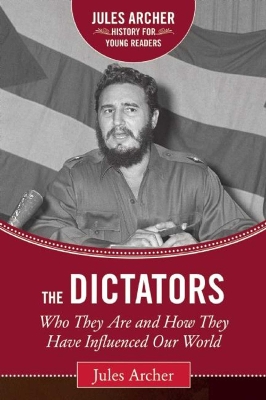Jules Archer History for Young Readers
17 total works
From the Boston Massacre in 1770 to the Los Angeles riots of 1992, mob violence in the United States is often sparked by unjust court decisions, unfair taxes, unpopular wars, the fear of unemployment, and racial and ethnic prejudice. But there are also seemingly senseless riots over wild concerts and sports championships. What causes a peacefully assembled crowd to turn into a mindless, violent mob? What causes a police force or militia to lose control?
In this timely, comprehensive overview, Jules Archer describes and explains the causes of mob violence in the United States and suggests that unless we make some basic changes in the nature of our society, the despair and rage that ignite mob violence may always be with us.
Resistance must begin with the self,” the author concludeswith the courage to say no when everyone expects us to say yes. Here, a well-known reporter of the deeds of dissenters, revolutionaries, rebels, and gadflies calls on his vast resources of observation and sympathy to help us take heart and turn the tide against our sea of troubles.
With vintage cartoons and prints to further explain the subject, Jules Archer reports the fascinating history of protests in America.
The son of a poor blacksmith who was an ardent Socialist, Mussolini grew up in an atmosphere of political agitation. He taught school for a brief time and then became a fiery journalist, attacking the government with a violence that caused him to be imprisoned eleven times before he was thirty. He was a genuine idealist, but he was also an opportunist. Mussolini used his influence to get Italy into World War I by accepting a bribe from France, thus betraying his cause.
Mussolini’s weaknesses were dramatically revealed by the fantastic blunders he committed during the war and by the swift collapse of his Fascist party under pressure. As defeat followed defeat, he was arrested but escaped to northern Italy, where he became head of a puppet government set up by Hitler. When World War II ended, he was executed.
Part of the Jules Archer History for Young Readers series by Sky Pony Press, this book is guaranteed to inspire interest in a crucial piece of American history
Today we recognize these unpopular ones as both brave and in the right. Their stories remind young readers that sometimes it is important to speak out against the popular opinions of the time. What are those opinions in today’s world? These fifteen men and women set stunning examples of standing up for what's right. Be inspired by their courage and perseverance when up against the odds. Whose unpopular beliefs today will be the truths of tomorrow? Will you be one of the unpopular ones?
In this book, renowned historian Jules Archer explores different cases of treason throughout our history, while encouraging young readers to really question the definition of treason and how it should be treated. He asks readers to consider the similarities between disloyalty and dissent and ultimately urges this generation to take it into their own hands to redefine American duties and liberties for our time.
Are political parties in America really different, or are affiliations based mostly on emotion and history?
What does party loyalty mean? Should you vote for the candidate or the party?
Do you have the right to participate in elections when you are under eighteen?
Even young readers can do their part in elections. Being informed is the first step in taking part in choosing the leaders of tomorrow. Voting is a fundamental American right, and this book gives young people the tools necessary to be active participants in the process.
His rise to power was bloody and ruthless, yet under his twenty-nine-year leadership, Russia became a mighty industrial nation. Illiteracy was banished, interest in the arts began to flourish, and Russia moved toward amazing scientific triumphs. Man of Steel is the story of Joseph Stalin, the man who rose to become absolute master of Soviet Russia and who cast his shadow over the entire globe.
Forty-four percent of general American history books do not even mention the struggle for women's suffrage, and 65 percent fail to record the name of Susan B. Anthony. Even more young readers have never heard the names of Margaret Sanger and Betty Friedan. As far as most of these books are concerned, women are invisible in American history. But these women dared to defy convention, at great personal risk, for the cause of sexual and gender equality. Their stories must be remembered. With a new foreword by feminist author Naomi Wolf, The Feminist Revolution relies heavily on letters, diaries, and other personal forms of communication to tell the story of women's rights in this country. Part of Sky Pony Press's revitalization of the Jules Archer History for Young Readers, series, this book is a must-read introduction to the Feminist Revolution for all young adults.
Jules Archer traveled to distant parts of the globe in search of information, sometimes going back to original sources. For this book he had dinner with Elvis Presley, had tea with two Australian prime ministers, climbed a volcano via camel, and swum the Seine in Paris at midnight. His adventurous spirit and enthusiasm will be contagious to young readers who may just leave their own indelible mark on a future decade. Sky Pony Press is pleased to add this important and thought-provoking piece of historical literature to its new Jules Archer History for Young Readers series.
These are the stories of the courageous men and women who stood up to the British king and made a revolution happen. To England, they were traitors. To the United States, they became patriots.
After the Civil War, freed slaves fought to overcome the still-prevailing prejudice and persecution. During this phase, Marcus Garvey led the Back to Africa movement, promoting Black Nationalism and black pride among the newly freed people.
And in the 1960s, a strong civil rights movement branched in two different directions. The first was headed by Reverend Martin Luther King Jr., who organized a powerful nonviolent civil disobedience movement to win equal rights through integration. Following a very different path, Malcolm X sought equal rights for blacks through violent confrontation and racial separation.
Together, these four men shaped the American civil rights movement. Racism is still a very relevant problem in our country today, and to better understand where we are now and how to make progress in the future, we must first understand where we’ve come from.
As MacArthur helped guide defeated Japan to democracy, it was remarked that he himself tolerated no democratic questioning of his commands. When he was summoned from Japan to take command of the desperately beleaguered forces in Korea, the conflict between duty and pride brought his career to a dramatic conclusion. With brilliant generalship he saved his army from defeat, only to be removed from his post when he refused to obey the president himself. Douglas MacArthur’s deeds were of heroic proportion, but he is, and will continue to be, one of America’s most controversial figures.
The lives of dictators are important because they have, to a large extent, shaped much of the world we live in, and will continue to do so for generations to come. We all know about Hitler, Stalin, Castro, and Mao Tse-tung. But we also have new names, such as Kim Jong Il and Kim Jong Un, and Muammar Gaddafi and Robert Mugabe. It remains imperative that we understand as much about these men as we canthe peace of the world depends on it.
In the fall of 1941, at the age of twenty-six, Jules Archer joined the US Armed Forces. A few months later, he joined MacArthur as a member of the small task force being sent to New Guinea.
With good reason not to expect to return alive, Archer and his troop were plunged into a new kind of war. They fought in a jungle among a primitive Melanesian people, some tribes of which were headhunters. For nearly four years they endured in the distant jungle. This is an inside look at one of the lesser-known stories of one of the worst wars the world has known. It’s a story of the absurdities, fears, camaraderie, and even humor of life as a wartime solider.
